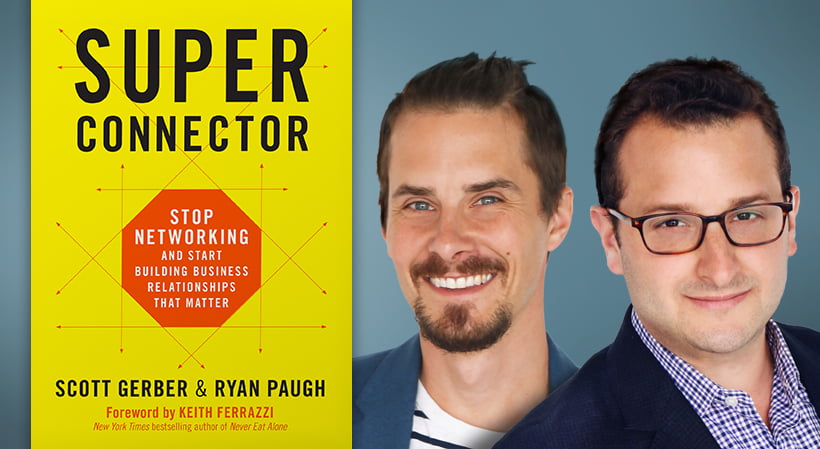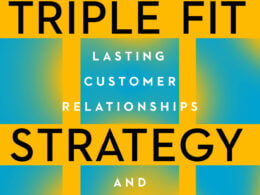For many people, the term networking conjures images of a crowded happy hour with people sipping lukewarm beer and collecting as many business cards as they can. Ryan Paugh and Scott Gerber, who cofounded the Young Entrepreneur Council, an invite-only organization for entrepreneurs age 45 and under, aim to change that.
Their new book, “Superconnector: Stop Networking and Start Building Business Relationships That Matter,” lands in bookstores today, and explains why that old, tired paradigm of networking doesn’t work, and how to build more authentic relationships instead.
We caught up with Paugh to discuss why he’s passionate about changing the way we connect, how he does it as an introvert, and the all-too-common question you shouldn’t ask someone you’ve just met.
The following conversation has been edited for clarity and brevity.
StartupNation: Why did you and Scott decide to write this book?
Ryan: When Scott and I met and started building the Young Entrepreneur Council, known as YEC, it was to help entrepreneurs like ourselves—we had both had major successes and major failures—make the experience of doing what we were doing less of a lonely place. We did that by connecting the right people, successful entrepreneurs, young, under the age of 40, with one another and through providing great resources.
We really learned a lot about how the best relationships are formed, and even more importantly than that, how relationships are not formed. We wanted to share those learnings with the world and help people put a lot of these really old-school networking practices that don’t work anymore (or never worked to begin with) out of their mind. We wanted them to start learning about real ways to connect and build relationships that are not so transactional in nature, but are more about establishing a bond with one another and providing mutual value over time. That leads to much higher levels of success for both parties, both personally and professionally.
Related: Tools for Cultivating Professional Relationships
StartupNation: So, how are the best relationships formed or not formed?
Ryan: To start with the not effective ones, I think that growing up in the social media era has really been a blessing and a curse for a lot of us. It’s a blessing because it’s just opened up our world to people across geographic bounds; it’s allowed people to share more intimate pieces of themselves that, especially if you’re inherently introverted, you might not feel comfortable sharing openly at your typical networking event. But it’s also been a curse because it’s made so many people focus on surface level relationships that never go a level deeper and turn into something more meaningful.
Real relationships, the more meaningful ones, are the ones that get past that surface level and have people really establishing a more meaningful bond with one another. I believe that that happens through taking that relationship away from this more promotional, transactional place and taking it a level deeper. It’s about determining and getting to know how you can support that person and knowing who that person really is.
From our standpoint, superconnectors are this new category of tradespeople that were born out of the social media era and learned how to get past that surface level and support people in more meaningful ways.
How that starts for them is by having a more giving, generous way about building relationships. We focus on how we can give before we can get back in return. I think that one of the important things about all superconnectors is that they’re just genuinely curious about other people. They like listening, and they like hearing about what other people are thinking.
That, for me, is really what separates the people that are building really great, genuine relationships today, and the people that haven’t gotten past that surface level of connection.
StartupNation: What are some examples of how entrepreneurs can build real relationships?
Ryan: For someone inherently introverted like myself, I steer away from big networking events and conferences. My business partner, Scott, is an extrovert and he can walk into any room and talk to anyone. I cannot. I tend to stand in the background and not build meaningful relationships until I actually have a chance to be in a more intimate environment with another person I want to talk to.
Every year we do this event called YEC Escape, which is an event for some of our entrepreneurs at a private ski mountain in Utah. We’ve got this great private lodge at the top of the mountain where members meet and are able to interact on a more intimate basis. Even that is too extreme for me.
I use a strategy in which I identify the people I want to meet, and then I make sure that I’m on the ski lift with them later on in the day when we’re skiing down the mountain, so I actually get a chance to talk to them, get to know them in a more private environment. I can actually connect with them without being in a crowded room.
Another good example of this is: One of the superconnectors in the book is a guy named Jon Levy out of New York, who hosts intimate dinners. It started with just a group of his friends who he thought were doing interesting things in different sectors. They would cook dinner together and just network in the privacy of his own home.
From there, it transformed into something greater. His friends were allowed to invite other people into the circle to participate in these events. And when you get there, you actually don’t know anything about the people except for their name and what industry they’re in. It’s really kind of a cool equalizer, where you don’t have that paralyzing effect of talking to someone who might be uber-successful in a specific industry. You’re all sort of on an equal playing field and you know very limited information about each other.
Sign Up: Receive the StartupNation newsletter!
StartupNation: Often we ask “what do you do?” when we meet someone new. But many people don’t like that question. What should we ask instead?
Ryan: Yeah, we hate that question. When you ask someone, “What do you do?” or even “How can I help you?” most people aren’t prepared to answer that question. They don’t know enough about you to know how you might be able to help. They’re not going to be able to really give you a good response.
Instead, we try to ask questions that will get people to talk about themselves, so that as the connector, you’re the one that’s going to do the work determining how you can help them and what it is you can do for them.
A good question that we like to ask is: “What are you working on right now that you’re excited about?”
I’ve rarely had an interaction with someone in our group where I don’t get a good response from that question.
StartupNation: Anything else you’d like readers to know about you or about this book?
Ryan: One of the things that’s really important to me and Scott is that people don’t read this book as gospel. We both have inherently different strategies and viewpoints in how we build relationships, but we both agree that it’s incredibly important and incredibly meaningful to people’s lives. I want readers to know as they read through our ideas that this isn’t about just taking our words and running with them. This is about reading the strategies that have worked for us and that have worked for the superconnectors that we showcase in the book, and applying that to your own life in the way that makes the most sense for you.
“Superconnector: Stop Networking and Start Building Business Relationships That Matter” is available now at fine booksellers and can be purchased via StartupNation.com.






